Why Taste of Things star Juliette Binoche feared: ‘This film is going to be a nightmare’
Juliette Binoche had doubts after her ex-boyfriend was cast as her lover in a new period romance. The French screen legend was proven right when a fight broke out in rehearsals.
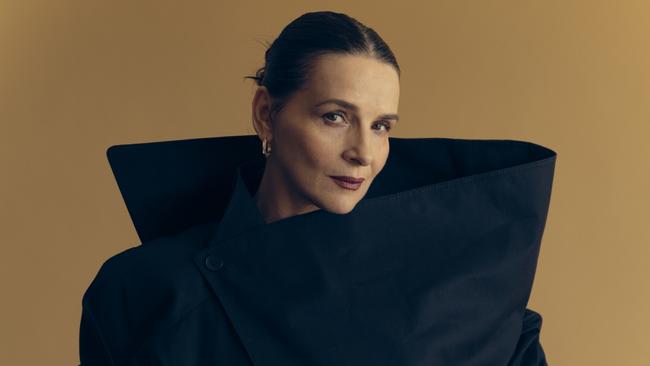
Juliette Binoche had serious misgivings when her ex-partner Benoit Magimel was cast as her lover in her latest film, The Taste of Things. The two had not worked together or socialised much since they split 20 years before, despite sharing a daughter, Hana, now 24.
“I was a little nervous,’’ Binoche says of teaming up with her former partner for the award-winning period romance. “I didn’t know how it was going to be.’’
The film’s director, Anh Hung Tran, tells Review it was his idea to reunite the celebrity exes on screen although he, too, admits: “I was scared about this idea. At the beginning I told Juliette that I would like to have Benoit, and she said, ‘It is not a good idea’; that he will refuse.’’
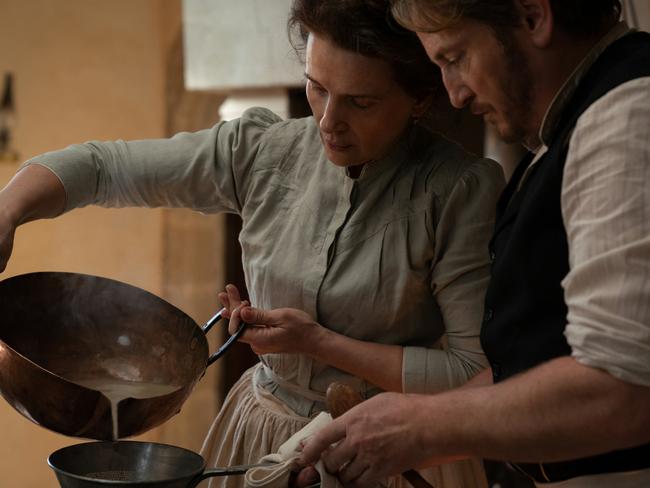
Nonetheless, the director of the Oscar-nominated The Scent of Green Papaya went to see Magimel without telling Binoche “and he said yes immediately. So I told her and she said, ‘It’s going to be very difficult to work with him’.’’ The French-Vietnamese director, who speaks flawless English (as well as French and Vietnamese) and who has a quiet, unflappable manner, remained confident “we would find a way” because both actors – who starred together in the 1999 film Children of the Century – are “great professionals”.
The pair duly signed up for The Taste of Things, about a supremely talented 19th century cook (Binoche) and her fellow chef and lover (Magimel), which would later snare the best directing prize for Tran at the 2023 Cannes Film Festival. A subtle meditation on enduring love and recovering from devastating loss, the movie was also France’s official pick for the best international film category at the 2024 Oscars – a decision that caused considerable controversy (more on that later).
Despite the film’s achievements, Binoche reveals that on the first day of rehearsals, she had an argument with Magimel. “There was a little bit of tension so I thought, ‘This film is going to be a nightmare’,” Binoche says.
The Oscar and Cesar Award winner is talking to small group of international journalists, including Review, in a Paris hotel suite, and she emphasises the word “nightmare” with a dramatic flourish.
Tensions rose when Binoche said Magimel’s character was appearing in too many of the film’s early cooking sequences. She argued this failed to serve the interests of the plot and – reflecting her power as an Academy Award winner and the first woman to be crowned Best Actress at the Berlin, Venice and Cannes film festivals – she got her way. “Benoit didn’t take it nicely,’’ she recalls, with a frankness that is hard to imagine in say, a Hollywood interview with a renowned A-lister. “He felt that I didn’t understand anything; that it felt like a betrayal.’’
However, according to Binoche, Magimel – who in 2001, won the Cannes Film Festival’s best actor award for his performance in The Piano Teacher – slept on it, and accepted the narrative logic of his former girlfriend’s point.
“The following day,’’ she says, “we kissed each other and said hello … and as we were going into the film it was very generally easy. “We would giggle quite a lot and enjoy the presence of each other and embodying those characters.’’
Binoche’s candidness about her and Magimel’s run-in on The Taste of Things set also contrasts with the film’s achingly tender, central romance. This period movie is described as “a seven-course love story for the soul’’ on Rotten Tomatoes, where it has a 97 per cent approval rating from critics. The Wall Street Journal called the film – to be released in Australia on May 2 – “ravishing” and “almost certainly a new classic of culinary cinema”, while The Observer’s Rex Reed wrote: “Binoche is as charming and focused as she was in Chocolat, turning The Taste of Things into a sumptuous symphony with magical, mood-changing movements.’’
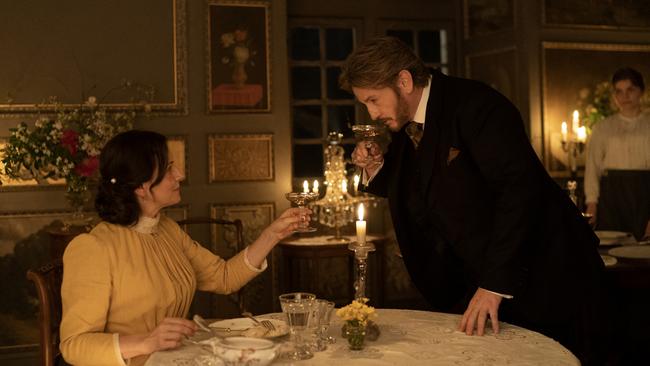
Magimel, who is 10 years younger than Binoche, has said of making the film with his famous ex: “For me, it felt very natural. We know each other well.’’ He also admitted to Vulture that during the shoot, addressing things they had not previously discussed was “demanding” and “not easy”.
Loosely inspired by Marcel Rouff’s classic novel, The Life and Passion of Dodin-Bouffant, Gourmet, and with a script co-written by Tran, The Taste of Things is set in France in 1889. It depicts the personal and professional bonds between the self-effacing, brilliant chef Eugenie (Binoche) and gourmand Dodin (Magimel). The pair are long-time lovers and, unusually for that era, Eugenie calls the shots – to protect her independence, she refuses Dodin’s offers of marriage.
The couple are as devoted to the culinary arts as they are to each other, even when the spectre of illness casts a long shadow over their relationship. Entire scenes – including the opening half-hour sequence – are given over to chopping, poaching, baking, skinning and flambéing a parade of eye-popping dishes. (Vegans be warned – almost every type of animal flesh one can imagine is on the menu.) Michelin starred chef Pierre Gagnaire is the movie’s culinary director and plays a small role in it. For Tran, though, the film is not about cooking per se, but becomes “a way to materialise their (the lovers’) sensuality and their happiness through this food … you can almost smell out of the film how it feels’’.
Binoche says of this theme: “Food is such a place of reconciliation, of warmth, of saying things without saying them.’’ The mother of two adult children adds: “It’s when you love someone – your children also – you want to give the best that you can. Even though sometimes you have to say, ‘You have to eat this’ – then it becomes a nightmare.’’ She laughs in a high-pitched yet delicate way.
The actor’s doe eyes dance as she cracks jokes throughout this interview with the expert timing of a seasoned comedian. Dressed in a royal blue denim-like long skirt and 70s-style high-heeled boots, in the way of actors, she looks 15 years younger than she is – she recently turned 60. She is nursing a hot drink as she has a heavy cold and there is a ragged edge to her voice, but she gamely presses on through a long afternoon of interviews that extends into early evening.
The actor, who came to international notice in The Unbearable Lightness of Being (1988), playing a photographer struggling with the infidelities of her husband (Daniel Day-Lewis) at a time of political upheaval, regards The Taste of Things as “almost the most French film I have done, not only with the cooking but also the writing of the language. … I’m surprised by how much he (Tran) feels comfortable with this refined way of approaching feelings and embracing this kind of woman (Eugenie) and independence.’’
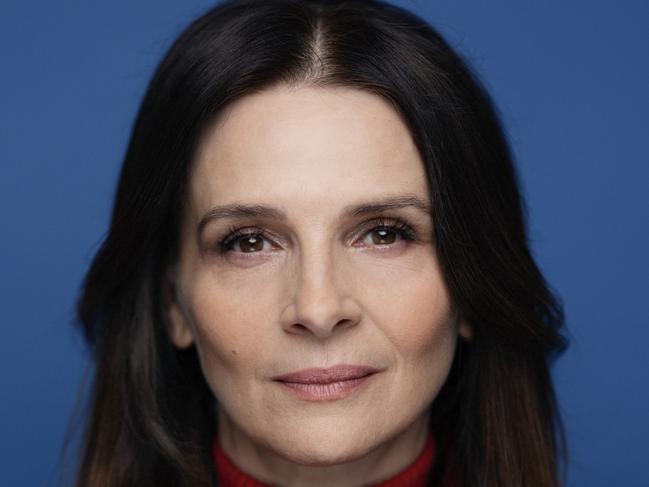
Review asks the actor whether Eugenie’s initial decision to reject Dodin’s marriage proposals is a bold feminist statement, given that unmarried women had little financial security or social status in the late 19th century. “I don’t think she thinks she’s feminist, she’s just being herself,’’ the actor replies. “She’s happy. She’s doing what she loves doing and she excels. And why more? … Getting married would mean that she would have to sit with a man while somebody (else) would cook maybe. She’s happy the way it is.’’
She adds: “I think there’s a fragility in her. She’s like an orphan; her two parents died ... and something’s going on that she doesn’t want to look at because it’s too painful.’’
Binoche, who was sent to boarding school aged four, and who has wondered how she survived that experience, learned to fend for herself in the kitchen from an early age. “I’ve always cooked,’’ she says. As a young adult her mother didn’t know how to cook staples such as rice, and “she said she will never do that to her children. She will teach them to cook the basics in order for them to survive in this world.’’
She and her sister cooked for each other during their teens. Their parents were divorced and “our mother was working somewhere else … I was 15.’’ Binoche jokes that “then, I met an Italian boyfriend, my first one, and it was only pasta for about two and a half years until I couldn’t take pasta any more’’.
In a career spanning four decades, the French superstar has worked with many internationally celebrated directors, including Kieslowski (Three Colours: Blue); Minghella (The English Patient); Hallström (Chocolat); Kiarostami (Certified Copy); Denis (Let the Sunshine In) and Koreeda (The Truth). In the 1990s and early 2000s, her Hollywood career took off as she won the 1996 Best Supporting Actress Oscar for her emotionally raw portrayal of a nurse in the World War II-set The English Patient, opposite Ralph Fiennes. Four years later, she earned a Best Actress Oscar nomination for her performance as a single mother and small businesswoman battling small-town prejudice, in Chocolat.
In 2001, she was nominated for a Tony Award for her Broadway performance in Harold Pinter’s Betrayal, and she is currently starring in the Apple TV+ drama, The New Look, about the intense rivalry between fashion designers Coco Chanel and Christian Dior.
Yet when replying to a question about her relationship with America, she says: “I’ve been forgotten … (by) the new generation anyway. Unless they had seen Chocolat, then they don’t recognise me.’’ Still, she notes that Americans have embraced The Taste of Things and that it is “always pleasurable” when that happens. She quips mischievously: “Choose only journalists who love the film anyway, who never feel that there’s any flaws.’’
Interestingly, there was speculation in France that the decision to anoint this period romance as France’s official Oscars pick for the best foreign film category was payback for Anatomy of a Fall director Justine Triet savaging the Macron Government when her courtroom thriller took out the Palme d’Or at Cannes. The French selectors overlooked Triet’s film for the Oscars category.
Even so, travelling under its own steam, the thriller went on to triumph at the 2024 Academy Awards, taking home the trophy for Best Original Screenplay and earning four more nominations, including for best film and best director.
Tran says the controversy was overblown. “It’s a pity that there was this argument in social media and the newspapers,’’ he says. “It’s stupid, very stupid because the choice of my movie to represent France, it comes from a small group of people. Just like (when) a small group of people in Cannes festival gave the Palme d’Or to Anatomy of a Fall, nobody protested.’’
In The New Look, which is streaming on Apple TV+, Binoche plays legendary designer Chanel alongside Australian Ben Mendelsohn’s Dior. This 10-part series is set during and after the Nazi occupation of Paris, and investigates how Chanel collaborated with senior Third Reich officers.
Binoche says of this dubious period in the designer’s life: “It was very difficult to find who she was, really, because she was hiding from her past and hiding dark sides.’’ To prepare for the role, she read 12 books about Chanel, researching her romantic heartbreak and how she was dumped in an orphanage as a child: “I found it fascinating – she had like 1000 lives, not just one. I was passionate about her – she is complex. But it’s so important to understand that she came from a very poor background – that explains a lot of things, not everything, but a lot of things.’’
The actor says filming the 10-episode drama “felt like being in a sportive marathon. I went through it. Well, it was rough because you had scripts coming (at) the last minute and you have to prepare. Also, I was doing The Taste of Things a month before starting the show, so you can imagine what it was.’’
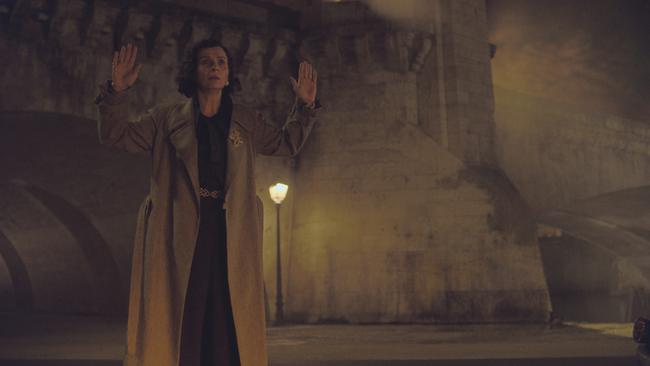
In the forthcoming film, The Return, she and Fiennes team up for the first time since they filmed The English Patient in the mid-1990s. The Return is a new interpretation of Homer’s The Odyssey directed by Italy’s Uberto Pasolini, and she will play Penelope, the wife of Odysseus, who is portrayed by Fiennes. She says that, traditionally, Penelope has been seen as “the ideal of this woman who is waiting forever for the man who’s going to war and having so many relationships, and yes she’s still there, always perfect’’.
She adds enigmatically: “Naturally, I liked the fact of Pasolini’s point of view, because it was not that idyllic.’’
Like The Taste of Things’ Eugenie, Binoche is in the autumn of her life. Her oeuvre spans four decades and she says “I am happy with what I’m doing, definitely. It feels to me that I went through the steps that I wanted to go through.’’ She laughs self-deprecatingly at how she mastered 19th century cooking techniques for The Taste of Things but “I forgot everything’’. “I did wonderful cooking, I impressed everybody and now – nothing,’’ she says, before posing for selfies with some clearly starstruck journalists.
She draws a contrast between cooking to create “something with your hands” and mass-produced food. She argues cooking from scratch at home “gives a special atmosphere in the house, because it’s filled with love, with care. You have to make the effort of running errands, of peeling, of cutting, of knowing what you’re doing. It’s all that. It’s really an act of love.
“... It’s our energy. When you see the way the industrial (world) is selling chickens that live in horrible circumstances … it’s not about quality it’s about quantity.’’ The star of Tran’s ode to French gastronomic culture also objects to food industry waste. “They throw things away in the garbage. This world is upside down,’’ she declares.
As for those tensions with Magimel, in a confessional moment that sounds as if it’s the result of years of counselling, she concludes: “You cannot resolve every single thing. You can only accept that there were things that were not perfect (between her and Magimel) and forgive and hope to be forgiven. And be graceful. We have a wonderful daughter who’s healthy and that’s really amazing.’’ The French star says that ultimately, The Taste of Things was “a wonderful medium to express my love for him, no matter what happened … I feel very much at peace now with him.’’
The Taste of Things opens on May 2. Rosemary Neill travelled to Paris with the assistance of Unifrance.


To join the conversation, please log in. Don't have an account? Register
Join the conversation, you are commenting as Logout